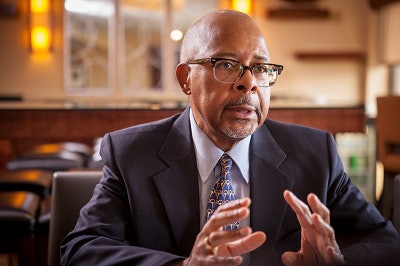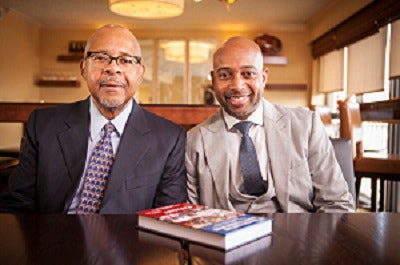Mentorship was the focus of Thursday’s panel discussion hosted by the Minority Achievement, Creativity and High Ability (MACH-III) Center at Prairie View A&M University, in partnership with the Melvin C. Terrell Educational Foundation.
Led by moderator Dr. Dawn Person – who directs California State University Fullerton’s Center for Research on Educational Access and Leadership – panelists spoke about mentorship’s role in diversity work, in the context of the career of their own mentor, Dr. Terrell, the founder and chair of the Dr. Melvin C. Terrell Educational Foundation and vice president emeritus of Northeastern Illinois University. Diverse served as a sponsor the event.
 Dr. Melvin C. Terrell
Dr. Melvin C. TerrellTerrell pointed to mentorship as a critical component of creating the “best holistic possible experience” for graduate students of color, especially amid COVID-19.
“They’re struggling financially, they are in immense amount of stress, they’re concerned about their health and safety, particularly during this pandemic,” he said.
Dr. Jerlando F.L. Jackson described mentoring as “the sharing of information and guidance that helps demystify a pathway, whether that’s a pathway to and through a graduate program or a career pathway.” He’s the chair of educational leadership and policy analysis at the University of Wisconsin-Madison, as well as a Vilas Distinguished Professor.
For him, a meaningful mentee-mentor relationship means the two “walk together through one’s journey,” sharing successes and concerns.
That includes a “psycho-social aspect” that goes beyond the formal bounds of academia, especially with student of color, said Dr. Elizabeth Dooley, professor and special assignment on women in higher education at the University of Central Florida.
 Dr. Melvin C. Terrell with Dr. Jerlando F.L. Jackson
Dr. Melvin C. Terrell with Dr. Jerlando F.L. JacksonShe highlighted how important it is for mentors to look after both students’ physical and emotional safety. When she worked at West Virginia University, for example, Dooley described getting a call from graduate students at 10 pm at night after they’d been racially profiled by an officer, who pointed a gun at a Black student in the passenger seat. She went with students to an attorney’s office the next day and confronted local police with them the day after that.
Mentorship is “24/7” and goes beyond an “investment,” she said. “… For me, it was accepting a social responsibility to be available to the students that I brought to an environment that may not have been conducive or supportive for those students. You cross the line into making sure that you’re an advocate, keeping those students safe and making sure they’re unharmed.”
Dr. Fred A. Bonner II, executive director of the MACH-III Center, emphasized that mentors offer their mentees of color “diversity institutional memory” to “not only value the contemporary but know where we came from.” He’s a professor and endowed chair in educational leadership and counseling at Prairie View A&M University.
“It’s important to be able to juxtapose George Floyd with Emmett Till, and I think that these mentors who have been there, done that, who have the history, who have the knowledge, we stand on their shoulders,” Bonner said. Because of them, “I think we have a better and more informed approach to equity, diversity, inclusion and belonging.”
He described three mentor archetypes: the connector, who helps with networking, the illustrator, who helps chart out a path toward career goals, and the sounding board. Most people need multiple mentors for this full spectrum of support, he said, but for him, Terrell has acted as all three. He credited Terrell, among others, for pushing him toward becoming a full professor.
“For so many Black males, for so many people of color, for so many diverse populations, that last rung, folks will tell you, ‘Well, it’s not that important. It’s ok, just remain an associate. You don’t have to worry about that,’” which prevents them from being a part of decision making, Bonner said. “A good mentor tells you, ‘No, no, no, don’t be satisfied with looking at light and shadows behind that opaque glass. You get in the room and participate and see the reality of what’s going on, not standing outside of the door.’”
Panelists praised Terrell for seeking out his mentees, rather than vice versa, and volunteering them for professional opportunities.
Too often, minority graduate students and scholars feel like they can’t seek out that guidance, said Dr. Michelle Morrow, director of scholarships at Northeastern Illinois University.
“Sometimes we think, as Black people, that we’re supposed to do this on our own,” she said. “It’s not weakness to ask for help. It’s actually strength.”
For her, that’s part of why it’s important to have at least one mentor who has a “sensitivity to what your walk has been in higher education” as a Black scholar.
And ultimately, a good mentor-mentee relationship can enhance the mentor’s career too, Dooley noted.
“… The value that you get from the generation that’s coming after us – my head cannot comprehend all that’s being done now,” she said. “So, I rely on those that have their hand on the pulse at this moment in time to educate me and help me. it’s a transformational experience I think for both the mentee and the mentor.”
Sara Weissman can be reached at [email protected].















